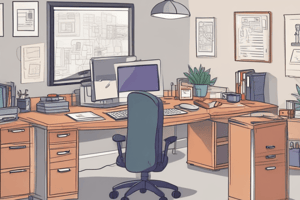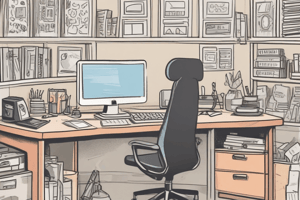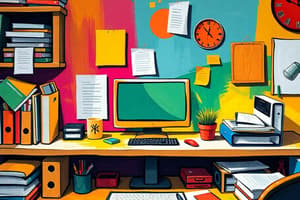Podcast
Questions and Answers
Which of the following is NOT considered a tool according to the broader definition provided?
Which of the following is NOT considered a tool according to the broader definition provided?
- Statistical tables
- Rewards and trophies (correct)
- Practical knowledge
- Automobiles
What is the most important factor to consider when organizing a workspace?
What is the most important factor to consider when organizing a workspace?
- The amount of decorative items displayed
- The aesthetic appeal of the workspace
- Choosing a workspace based on personal taste and the task requirements (correct)
- The comfort level of the workspace
Which statement accurately reflects the proper use of a desk?
Which statement accurately reflects the proper use of a desk?
- It should not be a storage depot for food. (correct)
- It should be used as an area to showcase awards.
- It should be a place for storing personal items.
- It should be cluttered to remind you of tasks.
How can discomfort in the workspace affect productivity?
How can discomfort in the workspace affect productivity?
What should you do before performing a task to ensure success?
What should you do before performing a task to ensure success?
What was W.C. Fields' reaction to his desk being organized by the efficiency expert?
What was W.C. Fields' reaction to his desk being organized by the efficiency expert?
What is suggested as a common mistake when trying to organize effectively?
What is suggested as a common mistake when trying to organize effectively?
What was the main reason for the friend's failure in college mentioned in the content?
What was the main reason for the friend's failure in college mentioned in the content?
What does the content suggest about the relationship between organization and effectiveness?
What does the content suggest about the relationship between organization and effectiveness?
What is indicated about the perception of a clear desk in the past?
What is indicated about the perception of a clear desk in the past?
What is one benefit reported by advocates of the deskless office?
What is one benefit reported by advocates of the deskless office?
What is a recommended first step in reorganizing your desk?
What is a recommended first step in reorganizing your desk?
How often is it suggested to review desk files?
How often is it suggested to review desk files?
What is one guideline for working effectively at a desk?
What is one guideline for working effectively at a desk?
What is a recommended method for enhancing concentration?
What is a recommended method for enhancing concentration?
According to the content, what is often true about files over one year old?
According to the content, what is often true about files over one year old?
Why should you reserve your workplace exclusively for work?
Why should you reserve your workplace exclusively for work?
What is one potential outcome of keeping a heavily cluttered and disorganized desk?
What is one potential outcome of keeping a heavily cluttered and disorganized desk?
What should you do to create a more effective work environment?
What should you do to create a more effective work environment?
What is suggested to do when you feel mentally blocked from a task?
What is suggested to do when you feel mentally blocked from a task?
How can you improve your follow-through on tasks?
How can you improve your follow-through on tasks?
Which method can help improve memory retention?
Which method can help improve memory retention?
What guideline is NOT recommended for improving memory?
What guideline is NOT recommended for improving memory?
What is the first stage of memory skills mentioned?
What is the first stage of memory skills mentioned?
What tactic enhances your commitment to a task?
What tactic enhances your commitment to a task?
Flashcards are hidden until you start studying
Study Notes
Organizing Tools
- Tools are essential for achieving goals.
- Tools can be tangible or intangible.
- Tools can be anything that helps you achieve your goals.
- Assess your needs and get the best tools available.
Workspace Organization
- Choose a workspace that is conducive to the task at hand.
- Consider the location, space, and ease of access to frequently used tools.
- Arrange tools based on frequency of use.
- Ensure workspace comfort for productivity.
Desk Management
- A desk should facilitate information processing, not be a storage space for extraneous items.
- Avoid using the desk for paper storage, food, or items to be remembered.
- Cluttered desks detract from focus and efficiency.
- Consider a deskless workspace for improved communication and freedom.
Desk Reorganization Strategies
- Clear out unnecessary items.
- Prioritize remaining items by importance.
- Organize files in deep drawers for quick access.
- Use stacking file baskets for incoming and outgoing work.
Desk Work Guidelines
- Keep only one project on the desk at a time.
- Store items off the desk when not in use.
- Avoid distractions and focus on the top-priority item.
- Use a dedicated out-basket for completed tasks.
Concentration Enhancement
- Thinking with a pencil enhances focus.
- Jot down ideas to clarify and view them collectively.
- Reserve the workspace exclusively for work to avoid distractions.
- Take breaks away from the workspace.
Effective Work Habits
- Stop working on a high note or at a point of accomplishment.
- Identify and address problems when stalled.
- Have a clear starting point to reduce resumption time.
Follow-Through Strategies
- Find interest in your work by gaining more information.
- Visualize the satisfaction of task completion.
- Set deadlines for motivation.
- Minimize interruptions and distractions.
- Collaborate with dependable individuals to reinforce commitment.
Memory Improvement
- Commit information to memory when rested.
- Break down lists into smaller units.
- Repeat information multiple times and write it down.
- Space learning into several periods.
- Relate material to familiar ideas or symbols.
- Use formula systems or code words for recall.
Memory Stages
-
Remembering: Leaving information to be stored.
-
Recording: Storing information in the brain.
-
Retrieving: Accessing information when needed.
-
Focus on improving recording techniques to enhance retrieval.
Memorization Techniques
- Utilize spare moments for memorizing, such as waiting time.
- Carry flashcards in your pocket for quick and easy review.
- To learn a new language:
- Use vocabulary cards and graded readers.
- Spend one hour daily reading and learning 30 new words.
- Review previously learned words for reinforcement.
- Modern memory aids, or mnemonics, can enhance memory capabilities.
- With proper training, most individuals can achieve remarkable memory feats.
- Examples include remembering shuffled card orders, names of 50 people, and over 100 phone numbers.
Handling Trivia in Batches
- Organise tasks into batches and handle them together.
- Examples of typical tasks:
- Paying bills, running errands, shopping, housework, yard work, minor repairs, correspondence, reading, and making phone calls.
- Consolidate errands, household chores, bills, phone calls, and letter writing into batches for increased efficiency.
- This approach prevents minor issues from hindering the achievement of more significant goals.
Problem-Solving Strategy
- Planning and goal setting are essentially decision-making processes, which involves problem-solving.
- A structured approach to problems is crucial for effective solutions.
- Avoid unnecessary complication:
- Seek simple solutions first.
- Resist the urge to make things complex.
- Approach problems creatively:
- Consider different perspectives.
- Use techniques like brainstorming or a checklist for new ideas.
- "Genius means little more than the faculty of perceiving in an unhabitual way," - William James.
- Differentiate Between Urgency and Importance:
- Prioritise important tasks over urgent ones.
- Avoid the tyranny of the urgent, as it can lead to neglecting essential but less pressing matters.
- Focus on achieving significant objectives.
- Anticipate Potential Crises:
- Proactive problem-solving is more effective than reactive solutions.
- Identify potential issues and take preventive action.
- Utilize Subconscious Problem-Solving:
- Relax and let your subconscious mind work on complex issues.
- Avoid excessive pressure to solve problems immediately.
- Allow for subconscious processing to generate creative solutions.
- Subconscious decisions are often more insightful.
Studying That Suits You
Use AI to generate personalized quizzes and flashcards to suit your learning preferences.




